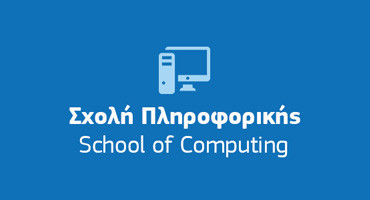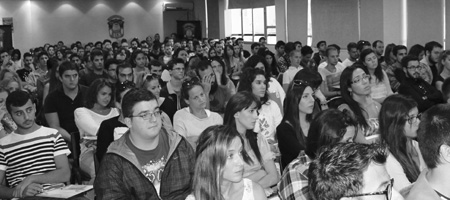





BSc (Hons) Artificial Intelligence and Data Science
-
TOP50 British University
-
Assessment through coursework
-
Modern High-Performance & Network Laboratories
-
Option to change direction in the 2nd year

Course Information
The School of Computer Science at Mediterranean College, in collaboration with the University of Derby (ranked 48th among British universities according to the Guardian University Guide for 2024), offers internationally recognized Bachelor’s and Master’s degrees. Our programs are designed in collaboration with prominent industry partners to deliver current and comprehensive knowledge across Computer Science, Data Science, and Cyber Security.
Big Data analytics, data processing and inference is one of the greatest challenges of modern society, while simultaneously opening significant opportunities. From autonomous vehicles with the use of Advanced Driver Assistance Systems (ADAS) to advanced medical systems like DaVinci robotic surgical system, data science and artificial intelligence impact nearly every sector. With the demand for related skills continuously increasing, now is the perfect time to choose the BSc (Hons) Artificial Intelligence and Data Science undergraduate program in this field, thus building a strong foundation for a successful career.
What you Learn
In our programme, you will gain a strong foundation in mathematics, data analysis, and programming, combining theoretical knowledge with practical applications for data processing and extracting useful insights. Additionally, you will study the fundamental principles of artificial intelligence and learn how to develop advanced AI models and systems.
As you progress into the second academic year, you will delve into more specialised modules such as Machine Learning, Advanced Programming, and Data Visualisation, which will further hone your skills in analysing complex datasets and developing innovative solutions. In the third year, the curriculum offers opportunities to engage in cutting-edge topics like Deep Learning, Natural Language Processing, and Artificial Intelligence Ethics. You will also undertake a major project, allowing you to apply your knowledge to real-world challenges. In the final year, you will have the flexibility to tailor your studies by selecting elective courses that best match your interests and career ambitions, ensuring a personalised and robust educational experience.
Why enrol to the Programme?
- The degree is awarded by the University of Derby, a top-ranked British university (TOP50, Guardian University Guide, 2024).
- You will have the option to change your direction in the 2nd year of the study either one of Computer Science, Cyber Security or Games Programming.
- You will be trained in modern High-Performance Computing Labs, Cisco-Certified Networks Labs, and Microsoft Azure Labs.
- You will be taught by certified lectures from the University of Derby, who combine string academic backgrounds with active professional presence.
- You will leverage the professional connections of Mediterranean College through internships and projects in collaboration with leading employers.
- Assessments primarily based on assignments and projects, focusing on real-world skills, with limited reliance on exams.
- You will develop into a bilingual IT professional with excellent academic and career prospects.
Year 1
Logic and Discrete Mathematics
The course "Logic and Discrete Mathematics" introduces fundamental concepts of Discrete Mathematical Logic, focusing on basic principles and applications. It covers topics such as Counting Principles, Graph Theory, and their applications in problem modelling. Additionally, it introduces Propositional Logic and First-Order Logic, developing essential skills in mathematical reasoning and algorithm analysis. Students apply these concepts to informatics problems, such as network optimization and complexity theory
Introduction to Probability and Statistics
The course "Introduction to Probability and Statistics" introduces students to the fundamental concepts of Probability and Statistics. It covers essential topics such as Random Variables, Probability Distributions, Statistical Functions, and Sampling Distributions. Additionally, it examines methods of Parameter Estimation and Confidence Intervals. Students acquire practical skills through applications using languages such as Python (NumPy, SciPy, Statsmodels) and R, developing a toolkit of mathematical methods and programming techniques for data analysis.
Calculus
The course "Calculus" introduces students to the fundamental concepts of Calculus and Algebra, with an emphasis on Group Theory. It covers basic structures such as Groups, Permutation Groups, and Cyclic Groups, as well as their applications in programming and cryptography. Students explore algebraic properties and their use in algorithms, while the course includes practical implementation of mathematical concepts through programming languages such as Python.
Programming
The course "Programming" introduces the fundamental concepts and principles of Programming, covering key topics such as Control Flow Structures, Functions, Recursion, Search & Sorting Algorithms, as well as File Input/Output (File I/O). No prior programming experience is required, as all practical exercises are conducted using the Python language in a modern Integrated Development Environment (IDE). The course emphasizes problem-solving, understanding algorithms, and developing programming skills through practical applications.
Introduction to Data Science and Modelling
The course "Introduction to Data Science and Modelling" introduces students to the fundamental concepts of Data Science (DS) and Modelling. It covers essential topics such as Data Types, Matrix Construction and Operations, and Data Visualization. Students extensively use Python libraries, such as NumPy for numerical computations, Pandas for data management and analysis, and Matplotlib for creating graphs and statistical visualizations. The course also focuses on data preprocessing techniques and an introduction to statistical analysis, providing practical applications in the analysis and modelling of real-world data.
Professional Work Skills
The course "Professional Skills and Behaviours" introduces students to the essential professional skills and behaviours necessary for successful integration into the job market.
Year 2
Legal, Ethical and Sustainability Issues
This course introduces students to legal, ethical, and sustainability issues in the field of informatics, with an emphasis on data protection, privacy, security, and intellectual property rights. It also examines good and bad ethical practices in the use of information technologies and analyses the sustainability of large technological projects, their business risks, and their environmental impact.
Team Project
This course enhances students' employability skills through the simulation of working in a professional team. Students participate in two activities: first, they are introduced to a simulated professional environment, and then they develop a small project for a real industrial employer. The course covers issues of project management, programming, ethics, legal matters, and teamwork, focusing on the needs of each specialization, such as software development and coding standards.
Linear Algebra
The course "Linear Algebra" extends the mathematical techniques introduced at previous levels, focusing on fundamental concepts of Linear Algebra (LA). It covers essential topics such as Linear Systems, Matrices, and Vector Spaces. Additionally, it introduces the concepts of Eigenvalues and Eigenvectors, as well as Projections and their applications in numerical and computational methods. The course includes practical application of these concepts to problems in optimization, machine learning, and data processing, using libraries such as NumPy and SymPy, among others.
Statistical Methods for Data Analysis
The course "Statistical Methods for Data Analysis" introduces students to the fundamental concepts of Statistical Analysis and Statistical Tests. It covers basic measures such as Measures of Central Tendency, Variance, and Random Sampling. Additionally, advanced methods such as Linear Regression, Multiple Linear Regression, Analysis of Variance and Covariance Analysis are examined. The course also includes the construction of Randomized Experiments and the writing of Statistical Reports. Students apply these methods using software such as R and Python, utilizing libraries like statsmodels and scipy.
Introduction to Machine Learning
The course "Introduction to Machine Learning" introduces students to the fundamental concepts of Machine Learning (ML), focusing on both Supervised Learning and Unsupervised Learning. It covers algorithms such as Linear and Logistic Regression, Decision Trees (DTs), k-Nearest Neighbours (k-NN), and Random Forests (RFs). In the field of Unsupervised Learning, methods such as Principal Component Analysis (PCA), t-Distributed Stochastic Neighbor Embedding (t-SNE), Clustering (K-Means, DBSCAN), and Autoencoders (AEs) are examined. The course includes practical applications in languages such as Python, using libraries like Scikit-Learn, TensorFlow, and PyTorch, with an emphasis on data analysis and the development of learning algorithms.
Pathway Modules
Operational Research
The course enables students to acquire the skills to apply Operational Research techniques in key areas for businesses and industry, with an emphasis on forecasting, planning, and decision-making. It focuses on developing a mathematical background to enhance students' modelling capabilities.
Functional Programming
The course "Functional Programming" broadens students' understanding of software development by focusing on the principles of Functional Programming (FP). It covers concepts such as Immutable Data Structures, Recursion, Higher-Order Functions, and Functional Control Structures. Additionally, it emphasizes the construction of Parsers, the creation of Abstract Syntax Trees (ASTs), and the application of functional techniques for data analysis and processing. The course uses languages like Haskell, focusing on practical applications in compilation, language programming, and algorithm optimization.
Year 3
Statistical Modelling
This course forms one of the foundations in data analysis. It involves the creation and evaluation of statistical models, using methods such as linear regression, generalized linear models (GLMs), Analysis of Variance (ANOVA), and non-parametric techniques like the Mann-Whitney test or the Wilcoxon test. Additionally, methods such as cross-validation are applied to evaluate model performance. Through these techniques, statistical modelling provides valuable tools for decision-making and understanding relationships between variables in each dataset.
Frontiers in Artificial Intelligence and Data Science
This course focuses on modern methods of Artificial Intelligence (AI) and Data Science, covering techniques such as neural networks, machine learning, Deep Learning, and reinforcement learning. It includes algorithms like Random Forests, Support Vector Machines (SVMs), K-Means Clustering, and Gradient Boosting, as well as methods for natural language processing (NLP) and computer vision. Students apply these techniques to real data, developing practical skills in analysis and modelling.
Deep Learning
This course (Deep Learning - DL) is an advanced branch of Machine Learning (ML) that uses Artificial Neural Networks (ANNs) to learn complex patterns from data. The key techniques include Convolutional Neural Networks (CNNs) for image analysis, Recurrent Neural Networks (RNNs) and Long Short-Term Memory (LSTM) for sequential data processing, as well as Transformers, which have revolutionised Natural Language Processing (NLP). Additionally, techniques such as GANs (Generative Adversarial Networks) are used for generating synthetic data, while Reinforcement Learning (RL) is applied to optimisation problems and autonomous systems. Deep Learning is widely used in fields such as image recognition, text translation, and autonomous driving.
Individual Project
The course allows students to independently develop a project related to their specialization, applying the knowledge and skills they have acquired. Under the guidance of an academic supervisor, they choose or propose a topic and work on writing a dissertation and developing a practical item. The project includes design, literature research, development, and evaluation.
Pathway Modules
Advanced analytics
The course "Advanced Analytics" (AA) includes advanced data analysis methods, focusing on Machine Learning (ML), Artificial Intelligence (AI), and Statistical Modelling (SM). It employs techniques such as Regression Analysis, Clustering (K-Means, DBSCAN), Decision Trees (DTs), and Random Forests (RFs) to extract predictions and patterns from data. Additionally, it includes Time Series Analysis (TSA) with algorithms like ARIMA and LSTM, as well as Sentiment Analysis through Natural Language Processing (NLP). Advanced Analytics is used in business forecasting, fraud detection, and operations optimisation.
Optimisation techniques
The course "Optimisation Techniques" (OT) focuses on improving algorithms and processes to maximise performance and accuracy in complex problems. It includes methods such as Linear Programming (LP), Nonlinear Optimisation (NLO), and Dynamic Programming (DP). Additionally, Evolutionary Algorithms (EA) like Genetic Algorithms (GA) and Particle Swarm Optimisation (PSO) are used. These techniques are applied to problems in routing, resource allocation, and machine learning.
We accept applications throughout the year until all available places in each department are filled. As this is an innovative programme at Mediterranean College, we encourage you to submit your application promptly.
Additionally, we offer multiple tuition fee payment alternatives, financing programmes, and scholarships based on academic, athletic, and socio-economic criteria.
Contact us today to learn more about the programme and the opportunities for tuition fee subsidies and financing. The education advisors at the Admissions Office will provide you with the necessary information about the programme and the application and enrolment process
Admission Requirements
- High school diploma or equivalent and a good level of English proficiency 1.
- The required level of English corresponds to IELTS 6.5 (B2+). If you do not have a language proficiency certificate, you will participate in the College’s English placement test.
- In addition, a reference letter from a teacher is required, and applicants will be invited to an academic interview with the programme director.
- Holders of vocational diplomas, or current university or college students in a related field, may enter the programme at an advanced stage through course recognition.
Recognition
You can have your degree recognized in Greece by applying for professional equivalence at ATEEN of the Ministry of Education.
Postgraduate Studies
Graduates with a BSc in Data Science and AI have the opportunity to continue their studies at the postgraduate level, choosing either technical fields or management disciplines, both in Greece and abroad. Mediterranean College offers the following pathways:
- MSc Big Data Analytics
- MSc Cyber Security
- MBA Global – Master of Business Administration
Career
The need for Data Science professionals is consistently increasing across various industries, including engineering, technology, society, commerce, and healthcare. Graduates of this programme are well-positioned to pursue careers in roles such as:
- Data Scientist
- Data Analyst
- Data Engineer
- Data Architect
- Machine Learning Engineer
- Business Intelligence Engineer
Testimonials
The 3 years I studied at Mediterranean College, I had the opportunity to further my knowledge and develop a range of personal and professional skills. I also learned how to work as a team to accomplish our goals. All the academic and administrative staff were really supportive and helpful....
Georgios Choutsisvilli, BSc (Hons) Computer Science.
Studying at the University of Derby was an interesting experience, the level of studies is really good but most of all we met people that we became good friends with. I wish all the best for their life and career....
Dimitrios Pozaritis, BSc (Hons) Computer Science
My time at the College was great. I made some great friends there who helped me overcome many problems. I learned a lot from my time there and I want to thank my teachers for supporting me throughout these three years....
Christos Avgerinos, BSc (Hons) Computer Science




